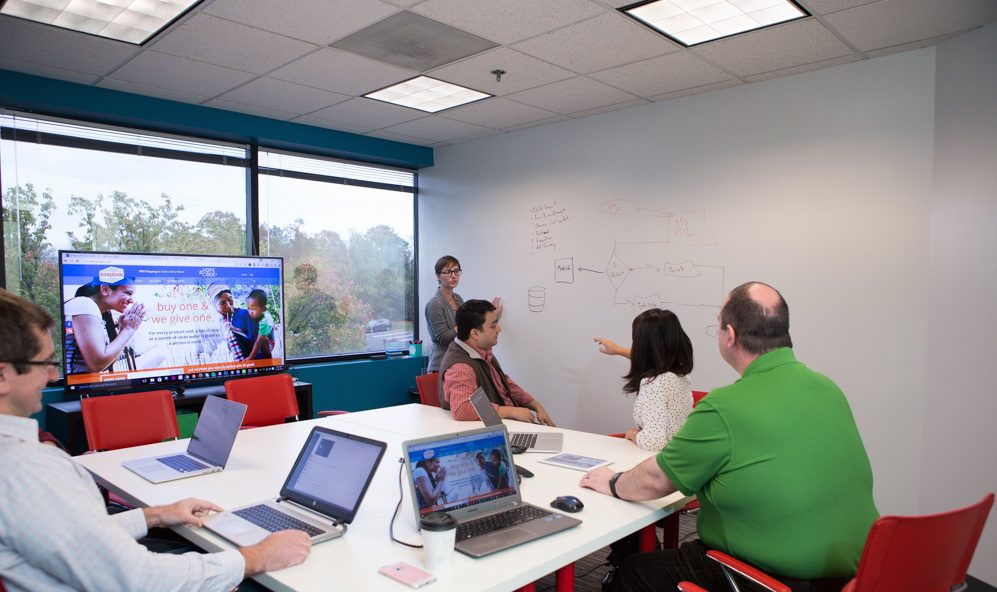Have you ever thought to yourself in the course of a day, “I could get so much more done if my manager weren’t standing in my way and if I didn’t have to go to so many meetings!”
You’re not the only one. In fact, it’s thoughts like that one that inspired flat organizations (also called horizontal organizations). These are businesses or groups that have found a way to self manage. Associates within the organization don’t necessarily report to a supervisor. They are responsible to each other for how they treat each other and for getting their work done.
And it can be an amazing thing.
In this post, RTS Labs founder Jyot Singh talks about how our flat organizational structure contributes strongly to our success. He chalks up the company’s success to four distinct principles.
Jyot believes not only in being accessible but also in making sure people are operating in a supportive environment where they are given the freedom and space to do their own work. To learn from each other. To accomplish as much as they are motivated to accomplish – not just completing tasks to please him or some other manager.
Here’s what he has to say.
There are no managers, no offices, not even an HR department at RTS Labs. Because these things get in the way of productivity. So many perfectly good days, ideas — even whole companies — can be ruined by a company’s own stale structures and hierarchy. But not at RTS Labs. We get more done with less stress. And, I say that’s because of our flat organizational structure (sometimes called a horizontal structure). This is what it’s really like to work with no managers and no meetings in a flat organization.
Don’t get the wrong idea. Having zero managers doesn’t mean there’s no hierarchy. Hierarchy is human nature — at least it is in American culture. The difference between the hierarchy at RTS Labs and the traditional hierarchical structure in most companies is that ours is always changing.
To start off, each individual employee comes to us with his or her own strengths. We ask our employees to leave their egos at the door and encourage everyone to open themselves up and learn from each other. As it says on every employment position we post, “We are a hard-working but casual workplace with no crap, few meetings, and a get-it-done philosophy.”
You might be scratching your head trying to figure out how things get done without managers micromanaging and meetings to talk about what we should be doing (rather than just doing it). We actually get a lot done despite the fact that there are no managers telling people what to do. There are four principles within our culture that make this concept work.
Hierarchy of knowledge
This passage by Frederic Laloux helps set up how we view hierarchy at RTS Labs.
“The right question is not: how can everyone have equal power? It is rather: how can everyone be powerful? Power is not viewed as a zero-sum game, where the power I have is necessarily power taken away from you. Instead, if we acknowledge that we are all interconnected, the more powerful you are, the more powerful I can become. The more powerfully you advance the organization’s purpose, the more opportunities will open up for me to make contributions of my own.
Here we stumble upon a beautiful paradox: people can hold different levels of power, and yet everyone can be powerful.”
The hierarchy of knowledge that we instill in our people is not about seniority. It’s about skill level. Nobody knows everything, but there are people on our team who are more experienced with specific things. If we are developing something in AngularJS, and there is a developer who needs a little coaching or advice on that language, the developer who is a senior in AngularJS becomes a mentor to that person or even that team. It doesn’t matter how long the senior Angular developer has been with RTS Labs or how old they are. They move up in the hierarchy of knowledge for the purpose of teamwork and mentorship.
That same person who is senior in AngularJS may be a junior in Java. In that instance, a developer who is a senior in Java becomes the mentor. Working like this helps our employees give and gain respect amongst each other.
Hierarchy of respect
Respect is very important in our culture, but it is not given with a fancy title. The hierarchy of respect is the notion that everyone comes to the table with a different perspective. No matter what level of knowledge you have or how long you’ve been here, you owe it to the team to have respect for the people working on particular projects. Let’s say for example that we are six months into a new project and we have to add a new team. Even if a senior guy joins the team, he’s still learning about that project. He needs to have respect for the people who have been working on the team.
Dependability
Everyone at RTS Labs has to be dependable. Dependability is the number one most important part of working here. Every employee has to ask themselves at the end of the day, “Can my team depend on me?” When you’re in a team you behave like a team. You work when the team works, you do things for the good of the project, and you contribute 100%. This is what dependability means at RTS Labs.
Remember in school when you were assigned a group project? There was always that one person who dragged the whole team down or didn’t put in the work. That is not acceptable here. No one should feel like they are running 100 miles an hour when the other person on their team is running 20 miles an hour in the opposite direction. And if they do, it is understood that communication needs to happen and the problem needs to be addressed and resolved quickly. We don’t carry animosity towards each other, and we don’t need managers to intervene. As a flat organization, we expect constant dialogue and communication so that there are no blow-ups.
Keeping a pulse on the environment
With all of the projects that we take on, some people might wonder, “What if there’s a problem?” or “When does a major decision maker intervene?” That’s where regular check-ins come in. I always make sure I have a pulse on what’s happening in the office. It doesn’t matter that I’m the founder of RTS Labs. Even I don’t have an office. I sit in the open area and work with everyone else.
I keep tabs on people, but not in a creepy eavesdrop type of way. I stay involved in what’s happening. Just sitting down with a team, or even passing by their desks for a quick chat, gives me a sense of where they are with projects and what’s going on between people and with the work.
Something else I do to help make sure I stay in touch with everyone is I conduct regular one-on-ones with strict parameters of what we’ll be talking about so that each meeting is meaningful.
We as a team at RTS Labs are self-managed and self-motivated. We’re always looking for new chances to improve our efficiency. My mission is to make RTS Labs the best place for a techie or developer to work. Having a flat management structure with situational hierarchy allows the team to stay focused on learning and growing. They learn to give and gain respect, they help each other grow, and thus deliver the best results to our clients.






